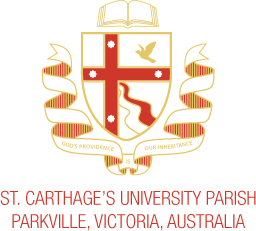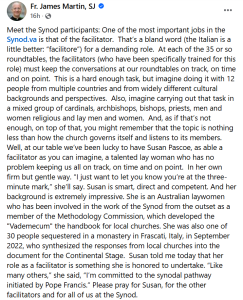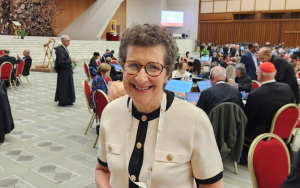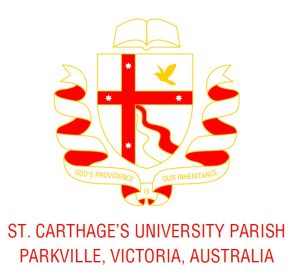Interpreting the signs of the times: doing theology in a
synodal way
Save the date: Lecture 23 May 5 pm-6.30 pm at
Newman College, University of Melbourne
Information on how to register for the talk to follow. We hope it will be recorded
for later viewing.
A talk and Q&A with Visiting theologian Fr Agbonkhianmeghe E. Orobator, SJ.
Please open link below for further details, and the second link for background information
Catholic Archdiocese of Melbourne’s submission for A Synodal Church
St Carthage’s submission response to the 2021-2023 Synod
With much appreciation to Constant Mews and Richard & Jan Curtain for organising and producing the following document, and to all those who participated in answer to their Invitation.
JOURNEYING TOGETHER
POWER POINT PRESENTATION PROVIDED BY SUSAN PASCOE FOR PARISH DISCUSSION ON THE 2021-2023 SYNOD (Link below)
27 Nov news 2021-11-04 – Synodality_Seminar_St_Carthages
SUMMARY OF DISCUSSION GROUP TUESDAY 23 NOVEMBER
St Carthage’s Parish Discussion Group on Synodality (23 Nov 2021) with Susan Pascoe
Some 18 people gathered at the Parish Office (access via laneway off Fitzgibbon St, around corner from Bayles St) with 9 attending on zoom. The ‘hybrid’ format seemed to work with Fr Joe operating the tablet, although the parish office can sit only 20 people max, making it essential to let the organizer know in advance who is coming in person; any larger, and the group would need to move to meet in the church.
We began by introducing ourselves briefly, and offering the Synod’s prayer to the Holy Spirit. Susan Pascoe then spoke about synodality (travelling together, literally sharing the road). Among numerous responsibilities, she is both a member of St Carthage’s Parish and a member of the Vatican’s Commission for Methodology planning the Synod on Synodality, a two-year process taking place between October 2021 and 2023. The other Commissions relate to Theology, Spirituality and Communications. This is a movement that began in August 2018, with the Pope’s Letter to the People of God, itself a response to revelations of widespread sexual abuse in the Church: Pope Francis: Letter to the People of God (full text) – Vatican News
While Catholics in Australia may be aware of the Plenary Synod that is taking place, SP explained the large context of what is taking place, a movement that is being driven by Pope Francis himself as part of his opposition to centralisation, clericalism and inefficiency within the Church, with a focus on the marginalized and the vulnerable. SP provided first the ecclesial and scriptural context, then the timeline of all the consultations that will lead to a working document (Instrumentum Laboris) being presented to the synod of bishops, meeting in 2023. Sister Nathalie Becquart has been appointed Undersecretary of the synod of bishops, the first time such a position has been given to a woman, promoting these reforms alongside Cardinal Mario Grech.
This is a major movement of renewal, being driven by Pope Francis, and firmly based on principles issuing from Vatican II and scripture, based on listening to all the baptised (I John 2:20: You have been anointed… and have all received the knowledge…). Pope Francis emphasises we are living in a change of era, that the laity must play an active role in the life of the Church, and that we must all be open to a path of personal and communal conversion to the Gospel. This is necessarily a complex task, which involves much listening and interaction at every level, both of individual communities as well as at national and international levels. “The Gospel is addressed to all, not just an enlightened few.” SP explained the complex process of interaction that will lead to a presentation to the synod bishops, a group formed in the wake of Vatican II, and the way the sensus fidei (the sense of faith) was first of all based in the community.
The discussion that followed was intense. The issue of moral injury was brought up of how the Church might respond to the thousands, even tens of thousands of people who had been hurt by behaviour of office holders within the institutional church. SP thought that while this would need something like a truth and reconciliation commission, something larger than the present synodal process; it must involve listening to those who have been hurt in one way or another. We discussed how many people have felt so alienated from the Church (including LGBTIQ+ and the divorced) that they do not feel any connection. Many have an outdated image of the Church, unaware of that promoted by Pope Francis, and being put into practice in parts of Victoria, where there is no priest. SP acknowledged the need to re-engage with the alienated, even though this is not easy, especially as weight tends to be given to the written word. Cardinal Grech hopes that people’s views can be represented, even when they do not align with the views of the episcopate. To the observation that the bishops at the Plenary Council did not appear to acknowledge the vast number of submissions received, SP acknowledged the importance of publishing submissions (other than those deemed offensive). We need ways of sharing pain. Debates now happening are like those stirred up by Vatican II. One speaker complained that sophisticated words did not necessarily reach the ‘man in the street’. The process of listening is not easy, but we must all be open to the path of conversion.
(provided by Constant Mews)



